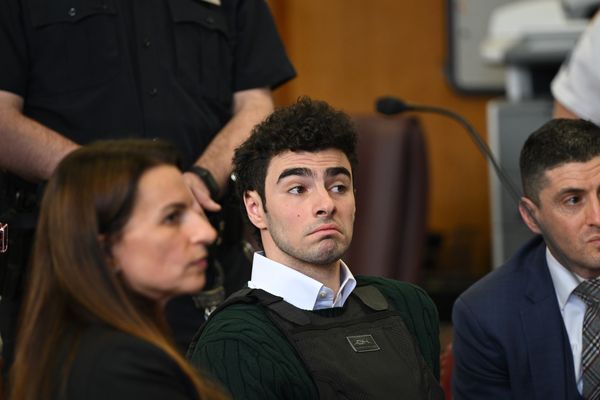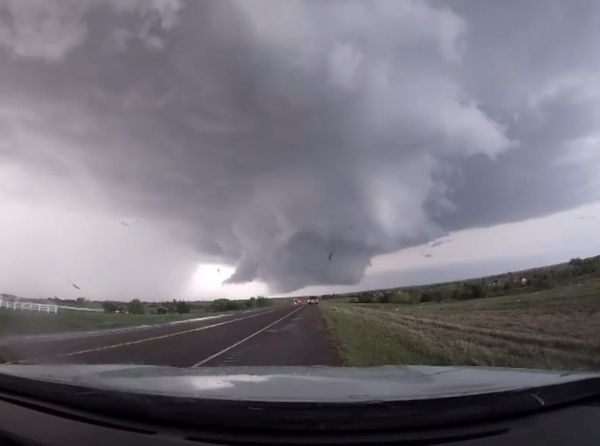
It is raining outside the Pitt Street Uniting Church. The sparse city streets in central Sydney have turned greyer in the morning downpour and the sandstone church sits squat between buildings many times its size. Beneath a banner calling for climate change action hanging between its columns, the Rev Josephine Inkpin creaks open the heavy timber door.
It is a busy morning for the minister. Morning prayer service has just wrapped up, and in an hour she has a Zoom call with her local MP. Next month will mark a year for her at the church, and she has a lot of plans for it – ministering to communities online and in person, social justice work, climate change action, opening the church up to secular recitals – but her attention has been drawn elsewhere.
Inkpin is the first transgender priest to be inducted into a mainstream church in Australia. And, as she speaks to Guardian Australia in a small, neat office to the side the church entrance, elsewhere in the country politicians and pundits are debating the religious discrimination bill and the point of whether and when religious people and institutions may be able to exclude or ridicule people like her.
“The religious discrimination thing has been quite …” she pauses a moment and sighs. “It’s always in the background.”
Later, after the proposed legislation was shelved, she will say: “It has been a gruesome week. It’s like you’re in a war, really, and there’s a little ceasefire at the moment, but there’s a promise of a new battle to come.”

‘I know the shame’
The religious discrimination bill has loomed large over Inkpin’s rookie year in the church, a year in which she also dealt with the disruption of Covid and death of her parents. Aside from the traditional work of a priest, it has meant, says Inkpin, a lot of extra work. She has been writing submissions, lobbying politicians, forming coalitions, and all the while taking calls from transgender and gay individuals and their families looking for advice, solace and recognition.
While she believes there is a gap in the law in recognising religious identity, which is important to address and fix, the bill is “giving people powers to oppress other people, that’s just not right”. She laughs, as though the statement is so obvious it’s absurd. “And it makes our lives more difficult.
“It’s damaging, I think, for maybe religion as a whole but certainly for a lot of Christian churches because people start to doubt whether or not places which actually are very gentle and kind aren’t, actually, interested in discrimination.”

Much of the general debate around the religious discrimination bill, and amendments to the sex discrimination act, has centred on “statements of belief” – that statements that would otherwise be considered discriminatory are not so when made in line with an honestly held moderate belief – and the rights of religious organisations, specifically schools, to exclude or discriminate against LGBTQ+ staff and students.
“The people who are most threatened by this legislation, or aspects of it, are LGBTQ+ children in religious families,” Inkpin says. Those children do not get to choose what schools they go to and what messages are debated in the public domain. If they go to a religious school where their very being is the subject of condemnation, she says, “not only will they be battling their community, but the government will actually be backing these people to make their lives more difficult”.
Her laugh has become incredulous. “I can’t get this: why would a secular government support particular people within churches or other bodies and choose sides on something that needs to be worked through in the religious community?”
Inkpin says schools need more education about transgender issues and identities, not less, and that transgender staff, too, need protection.
“Because I’m a minister and a priest who happens to be transgender, transgender people can identify with me and feel better, even if they don’t come near me or anything – just because I’m visible.” Transgender teachers can offer that to students and others – the sense that another way of being is possible and acceptable. “If you feel like you’re OK, you get on, don’t you? Because I know the shame,” she says. “It’s so destroying.”

‘An awful thing to carry’
When Inkpin was growing up in an Anglican family in England, she knew she different. There were nearly no transgender people in her world, and no language to understand what she was feeling. “You knew you loved, when you got the chance, dressing in garments that weren’t supposed to be for you, and a whole lot of other things – a sensibility about life.” But she could see no pathway for herself.
Sometimes people are surprised, she says, when she and other gay and transgender religious people say “that the thing that still partly oppresses us actually kept us alive”. Because while the whole world was telling her that she was something she felt she was not, “there’s this space, this reality, called God that says you are loved just as you are”.
As she grew older, she studied theology and joined the Anglican church as a priest in 1987. She found it a space where she could exist outside the confines of male behaviour. “There’s a bit more female sensibility, you might say. At the same time it was sort of trapping.”
That different role, or space, changed as life became more complex. She fell in love, “and it’s hard to unwind that”. Penny Jones sits with Inkpin in the Pitt Street church office, and they butt into each other’s sentences in furious agreement or to finesse details. Come July, they will have been married for 37 years.

Jones had been called to the church also. In England, where they lived, Jones was one of the first women ordained into the Church of England. This too complicated things for Inkpin. The pair have had different iterations as a clergy couple over the years, says Jones; for many of them “Penny was my boss” Inkpin interjects. It was unclear whether, if Inkpin came out, Jones would lose her job.
“It became a trap because if I came out then I would lose everything, apart from our relationship.”
Some 20 years ago, the pair emigrated from the North Dales to Australia. As they prepared to emigrate, the first transgender priest came out in England. “It was hard to hold it together,” says Inkpin. She would have had more support had they stayed in England. But as they moved to Australia they had to start a new life in a church that is generally more conservative. “So I sort of shut that away, literally pushed those things away.”
Shame, she says, “it’s an awful thing to carry around”. Even though she knew that she was loved, believed that she was perfect as she was in the eyes of the god she had dedicated her life to, “there’s still this little lurking doubt that’s been put into your mind.”

Shaking off the shame and doubt took time. “I realised I had to let go of what it was. I had to fall into the hands of the living god, as they put it. In doing that I realised it was fine. That was when, as I put it, female energy rose, and I was able to rise with that.”
When Inkpin came out in 2017, it was within their “little church” in Brisbane. One woman in the congregation (“just turning 90, I think”, says Jones) was ecstatic. Her grandson and two great-grandsons were gay. “It validated her experience,” says Inkpin. Both Inkpin and Jones continued to serve as priests in Brisbane, but when Inkpin was invited by the Uniting Church to lead Pitt Street, it was the first time a transgender person had been appointed and given a licence to lead as a minister in a mainstream church.
Jones had an awareness of Josephine from very early in their relationship. “It’s the old truism: I love the person, not the gender,” she says. Still, she had to embark on a process of self-education. “From my perspective it’s seeing Josephine being able to be herself, most fully and most joyfully. If you love someone, then that gives you joy.”
‘It’s quite wearying’
The religious discrimination bill debate arrived on the back of “five, six, seven years” of the trans and broader LGBTQ+ community being called on to defend itself, Inkpin says. That has meant years of writing submissions, forming campaigns and lobbying in defence of their existence as equals. “For things that just seem to be – ought to be – straightforward issues of human rights.”
It is as though, having lost the marriage equality issue, she says, some in the religious community “almost want to push us out, out of the way”.
All the while, “all sorts of people” have been contacting her as they grappled with their own gender or sexual identity or that of loved ones. “Sometimes it’s lovely, because sometimes they tell you wonderful things they’re doing, and you can encourage them, but it’s this sort of experience that’s below the surface,” Inkpin says. “A lot of that is buried, and that’s quite wearying, really.”
“It can be wearying,” says Jones. “But what keeps you going, you know, aside from the call of God, I think is that if who we are, and how we can live out our spirituality, can give encouragement and confidence to a queer person who is struggling, then that makes it all worthwhile. If one life is saved, that makes it worthwhile.”

Because those are the stakes, they agree. Young LGBTQ+ people are twice as likely as their peers to contemplate suicide.
Jones is confident change will come, that “love will win out”. She remembers when she was made a deaconess in England in the 1980s, she was ordained alongside women who had been wanting to join the clergy for 40 years. “We fear what we don’t understand. It will change.”
Says Inkpin: “I think we can deal with this as a society much better, but if people are going to play politics with trans kids’ lives, it’s horrific really and the impact is felt on all sorts of people. We’ve got to deal with the vulnerable first, and I would have thought that’s a basic Christian principle.”
Nevertheless, she says: “I see it like a sea change happening. The waves are coming in. You can try to be like the old kingpin who is telling them to go back and you can build a wall, but eventually – you can’t resist it.
“Sometimes the wave comes in and goes out again, sometimes it looks as if it’s getting worse, but I think eventually it comes back in again.”
However much the religious discrimination bill tries to push back that tide, she says, it will come in again.
“In the meantime it hurts people quite a lot, doesn’t it?”







